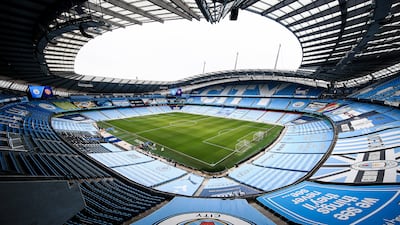The close of the 2021 flat racing season in the UK falls on Saturday with the Champions Day meeting at Ascot racecourse, which will a feature a strong line-up from the UAE-backed Godolphin operation.
For Hugh Anderson, the UK managing director, the day will be a successive milestone year in one of the biggest overseas commitments to British sport – the highlight of 2021 being the Derby success with Adayar in the Epsom classic.
Since its establishment in 1992 by Sheikh Mohammed bin Rashid, Vice President and Ruler of Dubai, Godolphin has become the world’s largest thoroughbred horseracing and breeding operation, spanning four continents from its base in Dubai.
The UK operation is the most significant and includes the successful stallion operation Darley.
Godolphin’s pre-eminence is supported by colossal investment with vast amounts of money spent underpinning the racing operation, bloodstock and breeding.
Between 2011 and 2020 that figure was £600 million ($823.7 million), according to published figures.
”Over more than four decades [Sheikh Mohammed] has shown a passion, commitment, depth of understanding of this sport that is unrivalled. He cares deeply for the people, the horses and the industry,” Mr Anderson said.
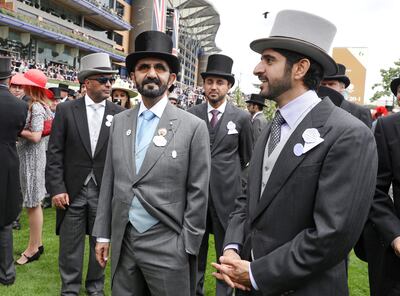
Few have the capacity or resources to match the ambition shown by UAE-based investors in British sport.
In addition to the Derby win, Manchester City are the current Premier League football champions. The club is at the pinnacle of City Football Group, the holding company that has offshoots in nine other countries, including America, Australia, Japan and India.
It is driven by the unparalleled success that the investment by Abu Dhabi has had on Manchester City over the past decade and the wider regeneration of the northern city. By any measure the return on investment has been huge.
Since winning their first trophy for more than three decades – the 2011 FA Cup – City have won five Premier League titles, including three of the past four. They are now unquestionably the dominant team in England. Just do not mention the Champions’ League, the one honour to elude them, most recently in May when beaten by Chelsea in the final.
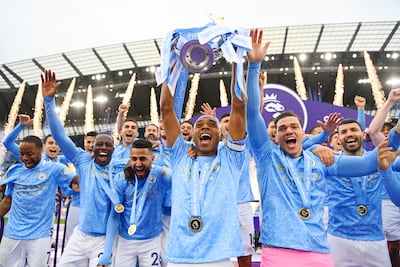
City sees itself not just as a football club. The skyline and streets in the east side of Manchester, for years a byword for deprivation, have been transformed with the development of the Etihad Stadium and concomitant world-class training complex, with a capacity itself of 7,000, built on a 32.5-hectare site that for years had suffered pollution from heavy industry.
The club is a champion of environmental issues and instigated through its 'City in the Communities' initiative an awareness of climate change and its impact on lives locally.
The club website says the "football effect" is used to promote health, education and inclusion among young people, not just in Manchester, but wherever the City Football Group has a footprint.
While the political and economic links between the city council and the club’s owners have been questioned, the leader Sir Richard Leese is adamant that without City Football Group support, "the story of east Manchester would be very different".
'Noisy neighbours' are now a leading force
It may be hard to believe for those from Gen Z that Manchester City were seen for many years as something of a laughing stock by their bitter rivals Manchester United. Sir Alex Ferguson, the former United manager, once famously dismissed them as "noisy neighbours". The abrasive Scot would rarely miss an opportunity to disparage the Blues, who only 23 years ago sunk into the third tier of English football.
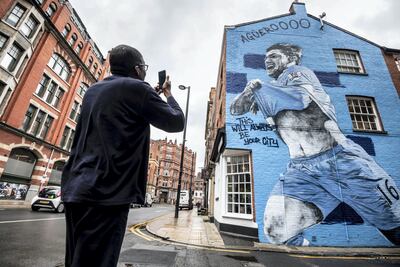
Even the takeover of the club in 2008 by the Abu Dhabi United Group did not stop the Ferguson barbs.
In 2009 he described City as a "small club with a small mentality" and he doubted their ability ever to meet United as favourites in any game. "Not in my lifetime", was his tart observation, one that has not stood the test of time.
Sir Alex has rarely been wrong in his distinguished career, but even he would now recognise that the east side of Manchester is a vastly different place to that of even a decade ago when it was an area of stagnation blighted by its industrial history.
Newmarket infused with Godolphin support
Newmarket, the headquarters of British horse racing, has similarly benefited, albeit on a smaller scale.
Godolphin’s influence and patronage is vital to the well-being of the town in Suffolk, which has had close royal connections since the time of James the First. Godolphin is the biggest employer in Newmarket, with more than 600 staff.
It is by far the biggest landowner with more than 400 hectares, and is a vital cog in the economic wheel of the town.
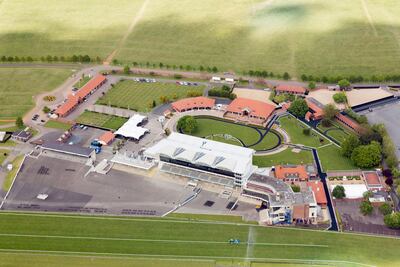
Godolphin’s growth has mirrored that of Dubai itself, which over the same period has evolved into a major centre for trade, commerce, business, tourism and sport.
“The sport has helped to showcase Dubai, which has never stood still. Its growth over the past 30 years has been staggering by any standards,” Mr Anderson said.
The UAE involvement in the town reaches well beyond the race track.
“We have a big impact on the community and we try to ensure that that impact is a very positive one,” Mr Anderson said.
"We are big supporters of the local school, the Newmarket Academy, through a charitable programme called the Beacon project, which over five years has gone from a failing academy to now getting the highest possible rating.
“That plays into Sheikh Mohammed’s wish to always invest in youth and education. That is how the Emirates have become so staggeringly successful. We see that replicated here in the UK.”
Philanthropy at heart of Godolphin ethos
In 2019 the Jockey Club unveiled a portrait of Sheikh Mohammed to honour his contribution to horseracing in Newmarket, the town’s economy and various good works, including a statue of Queen Elizabeth, saying it was English racing's good fortune that he should have based his racing empire in Newmarket.
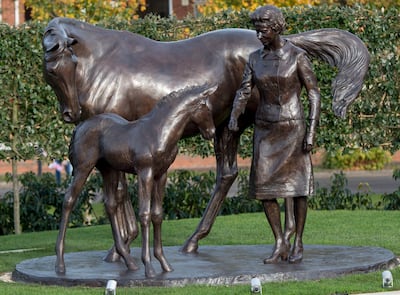
Other charitable programmes focus on the lifetime care of horses and in the professional development of people working in the industry.
The annual Stud and Stable Staff Awards recognise the commitment of racing staff across the industry and in that regard is a standard bearer for sport in general.
